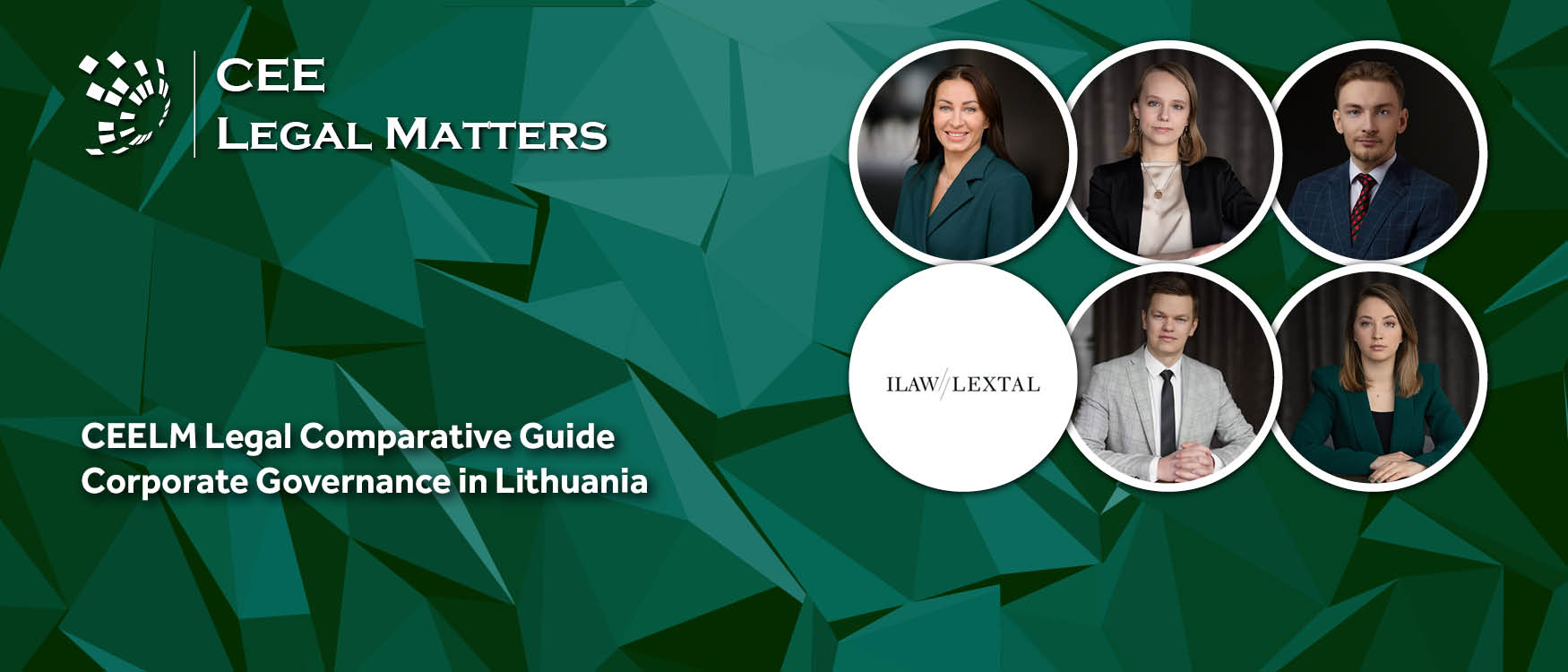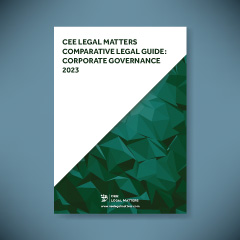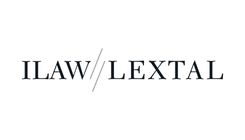Contributed by ILaw Lextal.
1. Corporate Structure Of The Companies
1.1. General Legal Framework
In a limited liability company, there is no shareholder limit despite the company being a private (UAB) or public one (AB).
Another popular legal form – a small partnership (MB), which is also a limited liability legal entity, has a maximum member count of 10. However, such members can only be natural persons. This legal form is often chosen by startups due to no requirements for initial contributions in the authorized capital, simplified accounting, ability to work as a CEO under a service agreement (in a public or private limited liability company (UAB and AB) an employment contract is mandatory for the CEO, naturally applying higher tax rates).
In general, there are no specific requirements a shareholder must meet to own shares in a Lithuanian company. Certain legal forms (e.g., credit unions) and companies (e.g., banks) have stricter capital and UBO transparency requirements. However, if an investor intends to start a regular business in Lithuania, the freedom of establishment is usually not limited. However, banks can refuse to open bank accounts for the company if the incorporator does not comply with AML requirements (e.g., the source of capital leads to untransparent jurisdictions or states subject to international or EU sanctions).
Generally, a shareholder is not liable under the obligations of a limited liability company. However, in case a shareholder abuses the limitation of his liability and acts in bad faith (e.g., adopts a decision to distribute dividends when the company is in debt to its creditors), courts can apply direct liability to the shareholder.
Separate legal acts establish different criteria under which a business is regarded as very small, small, medium, or large.
The criteria mostly are: (i) held asset value; (ii) turnover per business year; (iii) average employee amount.
For example, the Law on Corporate Accounting, which sets different accounting requirements depending on the company’s size, distinguishes accordingly:
- A company is regarded as very small if at least two of the following criteria are not exceeded:
- Asset value specified in the balance sheet – EUR 350,000;
- Net annual turnover – EUR 700,000;
- Average annual employee count – 10.
- A company is regarded as small if at least two of the following criteria are not exceeded:
- Asset value specified in the balance sheet – EUR 4 million;
- Net annual turnover – EUR 8 million;
- Average annual employee count – 50.
- A company is regarded as medium if at least two of the following criteria are not exceeded:
- Asset value specified in the balance sheet – EUR 20 million;
- Net annual turnover – EUR 40 million;
- Average annual employee count – 250.
- A company is regarded as large if at least two criteria of a medium company are exceeded.
1.2. The Function of the Supervisory Board
A Supervisory Board supervises the company’s business operations. If a Supervisory Board is absent, an Executive Board can take upon its functions.
It is responsible for:
- election of the members of the board (if no board is formed, the CEO) and their removal from office (if the company operates at a loss, the supervisory board must advise on the suitability of the members of the board (if no management board is formed, the CEO) to exercise their office);
- supervising the activities of the board and the CEO;
- submitting proposals and comments to the general meeting of shareholders regarding the company’s business strategy, the annual financial statements, the company’s draft of profit/loss distribution and the annual report of the company as well as the business activities of the board and the CEO;
- proposing the repeal of decisions of the CEO or the board if they contradict the laws of the Republic of Lithuania, the Articles of Association of the company, or the decisions of the general meeting of shareholders;
- deciding on other issues which fall within the competence of the supervisory board in the Articles of Association and decisions of the general meeting of shareholders.
To ensure competencies of long-term viability, a Supervisory Board must be re-elected not longer than every four years. Its functions cannot be assigned to other organs, only in the exceptional case provided above.
To ensure a proper strategical direction and the best interests of the company, the members of the Supervisory Board have an obligation to protect all trade secrets and commercial information obtained throughout the period they are in such a position. They are also obliged to avoid any conflict of interest or, if it arises, inform other organs of the company.
1.3. The Function of the Executive Board
The Executive Board discusses and decides on the business strategy of the company, the annual and interim report of the company, the management structure of the company and the positions of the employees, the positions to which employees are recruited through competition, regulations of branches, and representative offices of the company.
The board is also responsible for the appointment and dismissal of the CEO of the company. Their salary, working conditions, etc. are also determined by the board. It is also responsible for the timely and proper convening of the general meeting of shareholders. The board determines which information of the company shall be considered to be commercial/trade secret and confidential.
The Executive Board makes decisions on:
- the company to become an incorporator or a member of other legal persons;
- the opening of branches and representative offices of the company;
- the investment, disposal, or lease of fixed assets with a balance sheet value higher than 1/20 of the company’s share capital (calculated separately for every type of transaction), unless the company’s Articles of Association provide for a different value;
- the pledging and mortgaging of fixed assets with a balance sheet value higher than 1/20 of the company’s share capital (the total amount of transactions is calculated), unless the company’s Articles of Association provide for a different value;
- the provision of a guarantee or a warranty for the liabilities of third parties whose amount is higher than 1/20 of the company’s share capital, unless the Articles of Association of the company provide for a different value;
- the acquisition of fixed assets whose purchase price is higher than 1/20 of the company’s share capital, unless the Articles of Association of the company provide for a different value;
- other matters which are within the competence of the board in the Law on Companies, in the Articles of Association of the company, or by the decisions of the general meeting of shareholders.
The members of an Executive Board are obliged to follow fiduciary duties, which mean, among other things, being loyal to the company (e.g., avoiding conflict of interest), and acting in the best interest of the company. Other duties include acting with extra professional care and integrity and abiding by the law and decisions of organs that are in higher command. Members of the Executive Board also have the duty of protecting confidential information and trade secrets of the company.
If the board in corpore has made an unlawful decision or the decision against the interest and purpose of the company, such action can be declared void, if: (i) it violates the mandatory laws; (ii) the incorporation documents of the company; (iii) or the principles of reasonableness and fairness.
In case of a violation of these duties, the Executive Board members may be subject to civil liability, meaning the members may have to reimburse the damages caused by their unlawful acts. Liability can be addressed from two perspectives: liability of the whole Executive Board (in corpore) or liability of each individual member.
1.4. Conflicts of Interest and Related Party Transactions
In general, the Executive Board members and governing bodies have a duty to avoid any conflicts of interest with the company.
To mitigate the risks of any transactions with related parties, a member of the Executive Board of a company shall be obliged to inform other governing bodies and shareholders of the circumstances where his interest conflicts with the company’s interests. Such notice must indicate the nature and, where possible, the value of the interest. This information shall be given in writing or recorded in the minutes of the meeting of the organs company.
1.5. Legal Framework for Large Companies
See Section 3.1.
2. Corporate Governance Framework
2.1. Transparency and Public Disclosures
Although the general rule is that in Lithuania corporate decisions made by bodies of a legal entity are not publicly available, information about some of them (the fact of their adoption and the most important circumstances) shall be disclosed publicly. This applies to, for example, capital reduction, name change, reorganization (merger, division), conversion, and liquidation.
The law imposes a statutory obligation on the Articles of Association of a legal person to provide for the sources in which the mentioned facts shall be published. Such sources may be a daily newspaper of the Republic of Lithuania or an electronic publication for public announcements issued by the manager of the Register of Legal Entities. In practice, the second option is more common.
A very large part of the data on natural and legal persons is held in national registers. The data from the Register of Legal Entities, the documents held in it, and other information submitted to the register are public. Some of the services and data in this register are provided and made available free of charge, but normally a fee, set by the Government, must be paid for the service provided. For a fee, an extract of the company can be ordered and documents such as the Articles of Association and financial statements can be accessed.
The data of the Real Estate Register on immovable property, the rights in rem, the holders of these rights, the restrictions on the rights in rem, and other indications registered in this register are also public.
In addition, a register of beneficial owners was launched in Lithuania this year. This register is in place to prevent money laundering and terrorist financing and ensure transparency. Financial institutions and other obliged entities, such as auditors, bailiffs, and notaries, have a duty to check the information contained in it. However, the data in this register is also available to the public, who can request, for example, an extract of the identification data of the beneficial owners of a particular legal entity.
Listed companies as the ones with a higher degree of publicity should be singled out. For instance, they must publish the following information: annual and semi-annual financial information; notifications about the acquisition or loss of a package of shares and other financial instruments that grant voting rights; notifications about the acquisition or loss of own shares; notifications about the choice of its home Member State.
2.2. Public Authorities Responsible for Monitoring Corporate Governance
There is no universal set of good governance rules that can be applied to all companies, nor is there a specific body whose main function is to oversee the implementation of good governance.
It is different in the case of state-owned and municipal-owned enterprises because the state has approved the management policy of these entities (the policy is based on the OECD Guidelines on Corporate Governance of State-Owned Enterprises). The Management Coordination Centre has to monitor the governance of the mentioned enterprises, and the good governance index is used to assess the quality of their governance.
Companies whose securities are admitted to trading on a regulated market in the Republic of Lithuania are subject to the Corporate Governance Code for the Companies Listed on NASDAQ Vilnius. Although it is a recommendatory document, issuers must indicate in the annual report how they comply with this code, and if it is not complied with, the reasons for such non-compliance must be reflected in the said report.
The governance of companies operating in supervised sectors is monitored by supervisors, but only through the lens of regulatory compliance (the legislation itself enshrines many governance principles). For example, the Bank of Lithuania, the State Tax Inspectorate, the State Territorial Planning and Construction Inspectorate, the State Labour Inspectorate, and the State Data Protection Inspectorate.
2.3. ESG
This is regulated by the Law on Corporate Accounting, the Law on Consolidated Reporting of Groups of Companies, and the Law on Public Sector Accounting.
These laws provide for social responsibility reporting or similar information in certain forms of annual reports of legal entities.
The social responsibility report shall contain information relating to environmental questions, distinguishing climate, social and human resources issues, human rights, and anti-corruption and anti-bribery issues, with a special focus on bribery of foreign officials in international business transactions, as well as other information required under Article 8 of Regulation (EU) 2020/852. The information shall be provided to the extent necessary to understand the development, performance, condition, and impact of the undertaking.
Small and medium-sized enterprises shall have the right not to provide the reports and analyses mentioned above.
Public sector undertakings are required to provide a narrative analysis of their non-financial performance as a necessary part of the annual activity report.
Annual activity reports of public sector undertakings are submitted to the National Audit Office of Lithuania or municipal control and audit offices. For other companies, the annual report, together with the auditor’s report (where an audit has been carried out), is made public in the Register of Legal Entities and, in some cases, on the companies’ websites. Failure to comply with these obligations is subject to legal liability.
The content requirements for the relevant reports are determined by the directly referenced laws and it is recommended to follow the recommendations set out in the European Commission Communication on the “Guidelines for non-financial reporting” (2017/C 215/01).
2.4. Internal Controls and Fraud Measures
An internal audit is mandatory for public legal entities that are public sector entities.
Additionally, the audit of financial statements is mandatory for the following companies: (i) state and municipal companies, (ii) public interest companies; (iii) joint stock companies; (iv) private limited liability companies in which the State and/or the municipality is a shareholder; (v) private limited liability companies whose prices of goods/services are regulated by law; (vi) private limited liability companies, cooperative societies (co-operatives), general partnerships and limited partnerships in which all the full members are joint-stock companies or private limited liability companies if at least two of their indicators on the last day of the financial year exceed the following values: net sales revenue during the reporting financial year – EUR 3.5 million; the value of assets indicated in the balance sheet – EUR 1.8 million; and the average annual number of registered employees during the reporting financial year is 50.
The compilation of financial reports, the annual report, and the audit report must be submitted to the Register of Legal Entities within 30 days after the general meeting of shareholders, which are publicly available, meaning every person is authorized to obtain a copy of it. A copy of it can be obtained from the Register of Legal Entities upon request or directly downloaded from the internet. These services are subject to a fee.
The independence of the internal audit is regulated by the Law on Internal Control and Internal Audit of the Republic of Lithuania, as well as by the Order of the Minister of Finance of the Republic of Lithuania No 1K-402 of 23 December 2019 “On Implementation of Internal Audit.”
The independence of the audit of financial statements is regulated by the Law on the Audit of Financial Statements of the Republic of Lithuania; international standards and Regulation of the European Parliament and the Council (EU) No. 537/2014.
3. Shareholder And Board Committees
3.1. What Committees Are Prescribed by Law?
First of all, it should be mentioned that the main bodies in a company are the General Meeting of Shareholders and the sole management body – the CEO. The Executive and the Supervisory Boards are often a matter of company decision-making, i.e., the company is free to decide whether such a body is necessary.
In specific cases, the law foresees an obligation to establish one or both collegial bodies (the Executive Board and the Supervisory Board). For example, in a public limited liability company (AB), either an Executive Board or a Supervisory Board is mandatory. Other situations are mainly related to individual groups of undertakings, considering the importance of such companies to society, the scale of operations, the number of customers, etc. For example, in a credit union, the Executive Board is a mandatory collegial governing body, while in a bank, both the Executive and the Supervisory Board must exist.
A similar principle applies to the establishment of committees and commissions. In many cases, companies themselves assess the need for their creation and the scope of the issues to be addressed. However, there are exceptions to this rule.
Legislation requires some public interest entities, such as listed companies (where securities are traded on a regulated market in Lithuania and/or a Member State), banks, and insurance and reinsurance companies, to establish an Audit Committee.
A few examples of when the establishment of a Remuneration Committee is mandatory: (i) for a brokerage firm, where the average value of on-balance-sheet and off-balance-sheet assets for the four-year period prior to the last day of the financial year exceeds 100 million euros; and (ii) for a management company, where it is important because of its own/or the collective investment undertaking’s it manages size, organizational structure, and the nature, scale, and complexity of its activities.
Depending on the field of activity, certain companies are required to set up special purpose committees. For instance, credit unions are required to have Loan Committees (that consider loan applications from credit union members, determine the terms and conditions of the loan disbursement and repayment, etc.), while a brokerage firm that has exceeded the above-mentioned financial ratios is required to have a Risk Committee (to advise the management of the brokerage firm on the risks it has taken on, the firm’s risk-management strategy, and to assist them in overseeing the implementation of that strategy by senior management).
According to the aforementioned NASDAQ Vilnius Corporate Governance Code, issuers falling under the scope of the code are required to establish Audit, Remuneration, and Nomination Committees. If they choose to have less than these three committees, such an alternative approach should be explained. The functions of the Nomination Committee are to select candidates for vacancies in the supervisory and management bodies and to recommend them to the collegiate body for consideration, to regularly assess the structure of the supervisory and management bodies, etc.
3.2. What Committees Are Mandatory for Large Companies?
See Section 3.1.
3.3.Remuneration of Supervisory and Executive Board Members
Members of the Executive and Supervisory Boards may be paid bonuses for their work on the Board. In such a case, the decision of the General Meeting of Shareholders on the distribution of a company’s profit/loss must indicate, among other things, the portion of profit allocated for the payment of annual bonuses to members of the Executive and the Supervisory Boards.
The portion of the profit of the reporting financial year allocated for the payment of annual bonuses to members of the Executive and the Supervisory Boards may not exceed 1/3 of the portion of the profit allocated for the payment of dividends.
If a company fails to pay the taxes prescribed by laws within the established time limits, it may not pay the annual bonuses to members of the Executive and the Supervisory Boards. It shall be prohibited to pay bonuses to the members of the Executive and the Supervisory Boards in advance.
According to the case law of the Lithuanian courts, the shareholders’ meeting or other authorized bodies of the company may set different sizes of bonuses for different members of the same collegial body (the Executive/Supervisory Board). Such differentiation must be based on specific criteria, and the choice of criteria for the distribution of bonuses is at the discretion of the shareholders’ meeting or other authorized bodies of the legal person.
In this context, public limited companies whose shares are admitted to trading on a regulated market (i.e., listed companies) again stand out. Under the current legal framework, their General Meeting of Shareholders must approve the Remuneration Policy. The CEO is responsible for drafting such a policy and publishing it on the company’s website.
The Remuneration Report must also be published on the listed company’s website, so the remuneration data of certain individuals (the CEO, members of the Executive/Supervisory Board) is publicly available.








